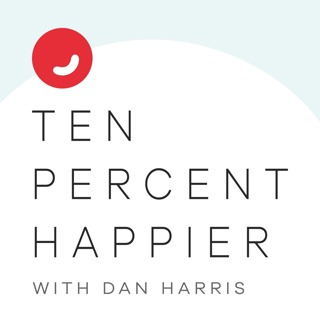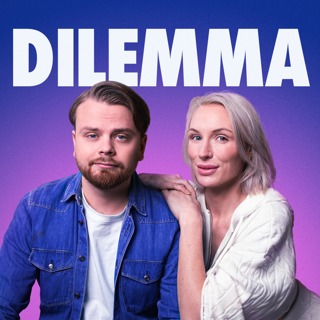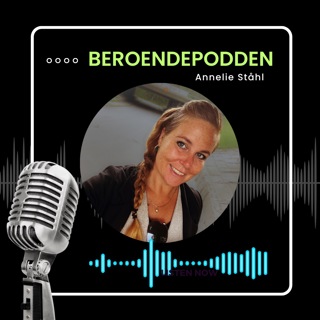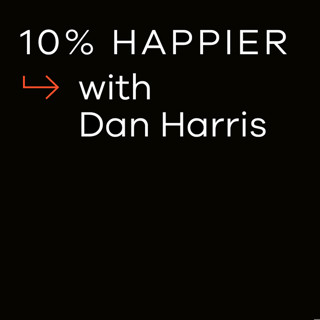
Dan Savage On: How to Handle Disappointment in Your Relationships, How to Get Better at Sex, and Why a 'Couple' is an Illusion
New episodes come out every Monday, Wednesday, and Friday for free, with 1-week early access for Wondery+ subscribers. --- Dan Savage has been writing the popular sex-advice column Savage Love for over thirty years. He also hosts the Savage Lovecast and is the author of numerous books. In 2010 Dan and his husband founded the It Gets Better Project, which was designed to give hope to LGBTQ kids. It was seen all over the world–and won an Emmy. In this episode we talk about: How to handle disappointment and jealousy How to get better at sex Why so many couples lose their spark and what to do about it How to date in the era of apps Why it’s so hard for straight couples to talk about sex Dan’s contention that the idea of a ‘couple’ is an illusion Related Episodes: Lori Brotto on mindful sex Devon and Craig Hase on how not to be a hot mess Myisha Battle on love, sex, dating, and relationship myths Sign up for Dan Harris’s weekly newsletter here Follow Dan Harris on social: Instagram, TikTok Ten Percent Happier online bookstore Subscribe to our YouTube Channel Our favorite playlists on: Anxiety, Sleep, Relationships, Most Popular Episodes For tickets to Dan Harris: Celebrating 10 Years of 10% Happier at Symphony Space: click here Full Shownotes: https://www.tenpercent.com/tph/podcast-episode/dan-savage-723
29 Jan 20241h 14min

The Science of Quitting: How, When, and Why to Do It | Julia Keller
New episodes come out every Monday, Wednesday, and Friday for free, with 1-week early access for Wondery+ subscribers. --- Sometimes perseverance is overrated. An argument for strategic quitting. Julia Keller is a Pulitzer Prize-winning journalist, novelist, and playwright. She has a Ph.D. in English Literature from The Ohio State University and has taught at Princeton University, the University of Chicago, and the University of Notre Dame, and was a Nieman Fellow at Harvard University. She was the chief book critic at The Chicago Tribune for many years before quitting the world of daily journalism to write books. In this episode we talk about: The history behind why quitting gets such a bad rap What happens in our brains when we quit Why we don’t give enough credit to quitting The myth of perseverance How to talk to our children about healthy quitting The power of having a community of quitters Related Episodes: The Myth of the Dream Job | Simone Stolzoff How To Find Meaningful Work in a Rapidly Changing World | Bruce Feiler Sign up for Dan’s weekly newsletter here Follow Dan on social: Instagram, TikTok Ten Percent Happier online bookstore Subscribe to our YouTube Channel Our favorite playlists on: Anxiety, Sleep, Relationships, Most Popular Episodes Full Shownotes: https://www.tenpercent.com/tph/podcast-episode/julia-keller Additional Resources: Download the Ten Percent Happier app today: https://10percenthappier.app.link/install
24 Jan 20241h 3min

The Science of Rescuing Your Attention Span | Gloria Mark
New episodes come out every Monday, Wednesday, and Friday for free, with 1-week early access for Wondery+ subscribers. --- Our ability to focus is not lost, it’s just changing. Here’s what we can adapt. Here’s a horrifying fact: the average attention span has now declined to just 47 seconds on any particular screen. 47 seconds! How did this happen? How can we get anything done this way? Today we’re going to meet the scientist who’s done this research, find out what’s driving this, and what we can do about it. And the good news is we really can do things about this. We're experiencing a fundamental shift in how we think, work, and focus. It shows up in our blizzard of notifications, zoom fatigue, task switching, and burn out. Dr. Gloria Mark is the Chancellor’s Professor of Informatics at the University of California, Irvine. She has been a visiting senior researcher at Microsoft Research since 2012. She’s written a book called Attention Span: A Groundbreaking Way to Restore Balance, Happiness and Productivity In this episode we talked about: Four myths about attention and technology The problem with frequent task-switching The surprising (to me) value of rote or mindless activities How to recognize when we are most distracted How to design your day based on your attentional resources How practicing forethought can help boost our attention and focus And Her thoughts on digital detoxes This episode is part of the latest installment of an occasional series we do, called Sanely Ambitious. If you missed last week's episodes, go check them out. We talked about the science of optimal performance, and also the science of failure, meaning how to fail well. Coming up on Wednesday we’re gonna talk about what the research says about when to quit, not just your job, but any endeavor. We will put links in the show notes. Related Episodes: The Science of Optimal Performance—at Work and Beyond | Daniel Goleman The Science of Failing Well | Amy Edmondson Sign up for Dan’s weekly newsletter here Follow Dan on social: Instagram, TikTok Ten Percent Happier online bookstore Subscribe to our YouTube Channel Our favorite playlists on: Anxiety, Sleep, Relationships, Most Popular Episodes Full Shownotes: https://www.tenpercent.com/tph/podcast-episode/gloria-mark
22 Jan 20241h 12min

The Science of Failing Well | Amy Edmondson
New episodes come out every Monday, Wednesday, and Friday for free, with 1-week early access for Wondery+ subscribers. ---- A Harvard Business School professor discusses how to get good at “intelligent failure.” Amy C. Edmondson is the Novartis Professor of Leadership and Management at the Harvard Business School. Her latest book is called the Right Kind of Wrong. Her research examines psychological safety and teaming within and between organizations. In this episode we talk about: The problems of shame, perfectionism, and social media How not to get caught up in analysis paralysis The importance of self-compassion and a growth mindset The benefits of worrying with someone else Why redundancy is your friend How to discuss failure without assigning blame Why accepting your smallness can be freeing Taking the time to learn from failure The cognitive framework: stop, challenge, and choose How to have a healthier relationships with anxiety and failure Creating a culture of psychological safety Recognizing that not everybody in society has the same permission to take risks Related Episodes: Self-Compassion Ain’t Always Soft | Kristin Neff Sign up for Dan’s weekly newsletter here Follow Dan on social: Instagram, TikTok Ten Percent Happier online bookstore Subscribe to our YouTube Channel Our favorite playlists on: Anxiety, Sleep, Relationships, Most Popular Episodes Full Shownotes: https://www.tenpercent.com/tph/podcast-episode/amy-edmondson-2023 Additional Resources: Download the Ten Percent Happier app today: https://10percenthappier.app.link/install
17 Jan 20241h 8min

The Science of Optimal Performance—at Work and Beyond | Daniel Goleman
New episodes come out every Monday, Wednesday, and Friday for free, with 1-week early access for Wondery+ subscribers. --- How to boost productivity, empathy, and focus, while reducing burnout. From the godfather of Emotional Intelligence. If you have any degree of ambition, one of the things you probably think about is how to perform at your best, or somewhere close, every day. How to keep your energy up. How to get into flow. How to stay focused and productive. How to play well with others. Daniel Goleman— his friends call him Danny—-has been thinking and writing about optimal performance for decades. He’s perhaps best known for his book, Emotional Intelligence. He’s a Harvard trained psychologist who also wrote in the New York Times for a while. And in his youth, he spent many years studying meditation in Asia, alongside many of today’s most intellectual meditation teachers like Joseph Goldstein and Sharon Salzberg. He’s got a new book called Optimal: How to Sustain Personal and Organizational Excellence Every Day, co-written with Cary Cherniss. In this episode we talk about: How to train your mind for optimal states How to reduce burnout How to develop and deploy empathy in a work setting How to give feedback A productivity hack that involves only doing the easy stuff The 4 parts of emotional intelligence—and how to get better at each And the future of EI in a world of AI This episode kicks off the latest installment of our occasional series, Sanely Ambitious. Over the next two weeks, we will be posting episodes on: how to focus in the midst of a pandemic of distraction, how to fail well, and when to quit. It’s a great lineup. Daniel Goleman’s online Emotional Intelligence Program Related Episodes: A Radical Approach to Productivity, Self-Compassion Series | Jocelyn K. Glei #494. How to Speak Clearly, Calmly, and Without Alienating People | Dan Clurman and Mudita Nisker The Science of Emotional Intelligence | Daniel Goleman #523. A Masterclass in Handling Yourself When Things Suck | Tsoknyi Rinpoche and Daniel Goleman #436. Brené Brown Says You're Doing Feelings Wrong Sign up for Dan’s weekly newsletter here Follow Dan on social: Instagram, TikTok Ten Percent Happier online bookstore Subscribe to our YouTube Channel Our favorite playlists on: Anxiety, Sleep, Relationships, Most Popular Episodes Full Shownotes: https://www.tenpercent.com/tph/podcast-episode/daniel-goleman-716
15 Jan 20241h 7min
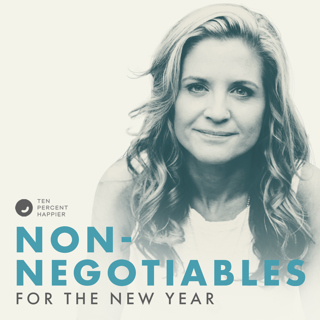
Glennon Doyle is Rethinking Her Relationship to Social Media, Hustle Culture, Intuition, Her Body, and Her Parents
New episodes come out every Monday, Wednesday, and Friday for free, with 1-week early access for Wondery+ subscribers. ---- The author/podcaster talks about her nonnegotiables at a delicate time in her life. Glennon Doyle is an author, activist, and the founder of Together Rising. She hosts the We Can Do Hard Things podcast and wrote the #1 New York Times bestseller Untamed, a Reese’s Book Club selection, which has sold nearly three million copies. Photo Credit: Alexandra Hedison In this episode we talk about: The concept of embodiment Undoing harmful deep conditioning around hustle and diet culture The role of Internal Family Systems in Glennon’s life Related Episodes: You Don’t Have to be Miserable While Doing Important Work | adrienne maree brown How To End The War With Your Body | Sonya Renee Taylor The Anti-Diet | Evelyn Tribole Sign up for Dan’s weekly newsletter here Follow Dan on social: Instagram, TikTok Ten Percent Happier online bookstore Subscribe to our YouTube Channel Our favorite playlists on: Anxiety, Sleep, Relationships, Most Popular Episodes Full Shownotes: https://www.tenpercent.com/tph/podcast-episode/ Additional Resources: Download the Ten Percent Happier app today: https://10percenthappier.app.link/install
12 Jan 202447min

How to Stop Obsessing Over Your Body and Eat Sanely in a Toxic Culture | Virginia Sole-Smith
New episodes come out every Monday, Wednesday, and Friday for free, with 1-week early access for Wondery+ subscribers. --- Plus, provocative and practical ideas about actually enjoying exercise, the real relationship between weight and health, the problem with weight loss, the morality of food, feeding your kids, and who "the real bad guy" is. Virginia Sole-Smith is the bestselling author of Fat Talk: Parenting in the Age of Diet Culture and The Eating Instinct: Food Culture, Body Image and Guilt in America. She also writes the Burnt Toast newsletter, hosts the Burnt Toast Podcast, and frequently contributes to The New York Times and other publications. In this episode we talk about: The actual connections between health and body size The severe limitations of many of the most popular approaches to weight loss Nuanced strategies for disentangling from diet culture How to exercise without a hidden agenda of trying to wrench your body into a specific shape The idea that food doesn’t have a moral value The relationship between men, exercise, food, and diet culture How our kids are getting caught up in diet culture, and what parents can do about it What Virginia's smartest critic would say about her contentions Her take on Ozempic Related Episodes: Dharma teacher Cara Lai on mindfulness and exercise Jud Brewer on “The Hunger Habit” Evelyn Tribole on “The Anti-Diet” Full Shownotes: https://www.tenpercent.com/tph/podcast-episode/virginia-sole-smith
10 Jan 20241h 14min

The Science of Why You Eat When You're Not Hungry–And How to Stop | Judson Brewer
New episodes come out every Monday, Wednesday, and Friday for free, with 1-week early access for Wondery+ subscribers. --- Dr. Jud breaks down how habits work and how to change them. Plus, insights on stress, boredom, mindfulness, pleasure, satisfaction, and contentment. Judson Brewer M.D., Ph.D., is an internationally renowned addiction psychiatrist and neuroscientist and a bestselling author. He is a professor in the School of Public Health and Medical School at Brown University. His new book is called The Hunger Habit: Why We Eat When We’re Not Hungry and How to Stop. In this episode we talk about: The scientific evidence behind Dr. Jud’s approach The difference between satisfaction and contentment The difference between hedonic and homeostatic hunger Why changing behavior may not require you to dig into your past “Unforced freedom of choice” The “bigger better offer” The “pleasure plateau” Habits vs. addictions “The hunger test” The Buddha’s advice on eating Whether or not we can still eat gummy worms Related Episodes: Dr. Jud’s anxiety Q&A Dr. Jud on anxiety as a habit Dr. Jud on addiction and bad habits Evelyn Tribole on intuitive eating Full Shownotes: https://www.tenpercent.com/tph/podcast-episode/jud-brewer-hunger
8 Jan 20241h 13min
